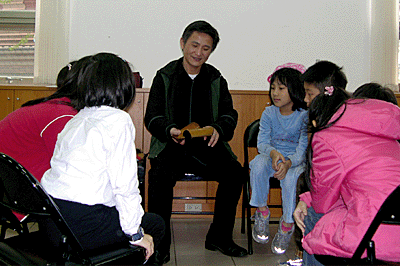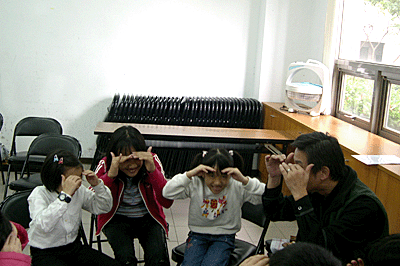| The interview contents of Mr. Lin, Wen-bin¡G |
| |
1.
|
Mr. Lin, when did you start to learn bamboo clappers? How many years have you learned? |
|
I started to contact speak and sing art from nineteen years old. At twenty four years old I started to learn bamboo clappers. Now I am forty years old, I have already learned bamboo clapper for twenty one years. |
| |
| 2. |
Where did you learn bamboo clappers? |
|
In the beginning, when I first contacted bamboo clappers, Taiwan didn¡¦t have any related materials about bamboo clappers, I learned it from tapes. At that time, Taiwan and Mainland China still didn¡¦t open contact, there were no recording tapes in Taiwan, and no one can perform. I learned it from radio and recorded the contents of program, and followed the tapes to learn. Of course I couldn¡¦t play well. Because I play drum myself, so I improved the skill of playing drums and transformed the play method of hitting bamboo clappers. I played ¡uQi-kuai-ban¡v at age of twenty six when Taiwan and Mainland started interaction. I went to Tianjin to learn from some reputable teachers. I absorbed and understood thoroughly the skills of masters, with my own thinking and creativity, bamboo clappers slowly developed as a kind of Taiwan local performing art. |
| |
| 3. |
Why have you decide to learn bamboo clappers? |
|
The main reason is I like it. In my childhood, when I heard the performance of bamboo clappers from radio, I like the way of this performance. Afterwards, I used recorder to record programs and learn them often. There were also several unforgettable performing experience which made me fell in love with the ¡uspeak and sing art¡v. Finally it becomes my profession. It is a very happy thing that you can hold your interest as your profession. |
| |
| 4. |
What are the advantages of learning bamboo clappers? |
|
| (1) |
Strengthen the ability of coordinate - Training the coordination of hands. |
| (2) |
Promote the ability of expression - Training clear pronunciation and the ability of language expression. |
| (3) |
Contents filled with knowledge - The contents of each performance filled with history allusion and brilliant substances, you can obtain a lot of knowledge. |
| (4) |
Promote literature accomplishment - The contents are filled with concise and graceful diction, can enrich literature accomplishment. |
| (5) |
Promote the ability of reaction - Using two hands at the same time, and need to read the contents aloud, can train the skill of doing three things at the same time. |
| (6) |
Train the sense of rhythm |
| (7) |
Promote the equilibrium development of left and right brain |
| (8) |
Learn traditional skill |
|
| |
|
5.
|
How many kind of bamboo clappers are there? How are they made of? How to select good bamboo clappers? |
|
¡uSan-Kuai-Ban¡v (three-piece clappers)and [Qi-Kuai-Ban] (seven-piece clappers) are commonly used in the bamboo clappers. Qi-kuai-ban is also classified into Peking Clappers, Tianjin Clappers and Wang Fraction Specialized Clappers. Besides, there are also specialized clappers for Taiwan south tube, which is called ¡uFour-piece clappers¡v. In the making of bamboo clappers, first you have to choose bamboo in the right season. Meng-zong bamboo and Mao bamboo are most chosen. The bamboos that are chosen must have bigger tube and thinner wall. After choosing the bamboo, should let it dry in the wind, cut the proper size, grind round in the edges and punch holes. The position of punching hole should be precise, and then the grinding of detail, finally, bind with rope, then the bamboo clapper is done.
|
| |
|
| 6. |
How many forms of bamboo clappers are there? How should the beginners learn? |
|
I will recommend children to start practicing from rhythm, then learn from ¡uSan-Kuai-Ban¡v, left hand beats time, right hand beat ¡§Hua¡¨, single sound beat meter, proceed step by step in an orderly way. Of course the more clappers there are, the more difficult it will be. |
| |
|
| 7. |
What are the characteristics of bamboo clappers? |
|
| (1) |
Portable¡GYou can carry them everywhere. For example, I had carried bamboo clappers with me to more than forty countries and one hundred cities. |
| (2) |
Simple¡GYou can wear suitable clothes on stages. Even on formal occasions, it's proper to wear long Chinese robe. The site doesn¡¦t need any special decoration. |
| (3) |
Full of Rhythm: Although there are only a few clappers, various level sounds can be presented. |
| (4) |
Contents easy to understand and access. |
| (5) |
Flexible: Contents can be deep or shallow, elegant or popular. |
|
| |
|
| |
 |
| |
|
| |
|
8.
|
How long have you engaged in the business? What kind of unforgettable experiences do you have? |
|
I started my amateur performance since 19 years old, which totals 21 years till now. Strictly speaking, I fully devoted to this profession since the age of 26 when I retired from military service. It¡¦s almost 14 years up to present.
There are countless unforgettable moments. I especially remember the excitement when I first watched the entire bamboo clappers show in Mainland.
During my apprenticeship in Peking and Tianjin, the teachers¡¦ guidance and caring are also deeply appreciated. The standing obeisance from the audiences during my first on-stage performance will forever be in my mind. Another memorable scene is my overseas performance in South America when I earned twice unstoppable applauses from 20,000 non-Chinese speaking audiences. This makes me realize that Art has no boundary; it is the best diplomatic tool.
|
| |
|
9.
|
When did you join the Taipei Qu Yi Tuan? Why? |
|
I co-founded the organization with Mr. Liu Tseng Kai when I was 26 years old, hoping that more people can practice ¡§ancient Chinese rap¡¨. |
| |
|
| 10. |
Do you have a steady income? |
|
Certainly not. My income generates from teaching and performing. However; our performances and lectures are not stable, not to mention stable income. General public think working to make money is unpleasant and painful. I have chosen my favorable activity as life-long career, therefore I feel lucky enough to be able to self-entertain and to provide a living at the same time. |
| |
|
| 11. |
Have you encountered any difficulties? |
|
Surely. I feel frustrated when the students do not get the point. Another troublesome occasion would be when the ¡§DuanTze¡¨ is too difficult to learn and that we are running out of time. The most uncomfortable matter would be to perform in inappropriate places where on-stage actors are performing while off-stage audiences are dining. We really felt not being respected. |
| |
|
| |
 |
| |
|
| 12. |
Have you ever made ¡§slips¡¨ on stage? |
|
Pretty often. Nevertheless, it is acceptable to make mistakes on stage. My experiences are accumulated from impromptu performances. Professional entertainers should be able to let audiences accept the error or to sympathize with the error. This is the charm of stage performing. The difference between CD and on-stage performing is that the latter is always full of suspicion and expectation. |
| |
|
| 13. |
How many performances have you participated? |
|
Starting from the age of 28, I have formally performed over 5000 occasions (excluding impromptu performances in class). |
| |
|
| 14. |
Where do you teach? |
|
| I lecture in the following places¡G |
| (1) |
Taipei Qu Yi Tuan. |
| (2) |
School organizations: Taipei Municipal Guang Fu Elementary School is one of them. |
| (3) |
Li-Ming Social Education Center: Two seminars per year, we have cooperated for 5 years. |
| (4) |
Government institutions: such as Taipei Culture Center, Taipei City Government-Department of Culture Affairs, cooperate foundations. |
| (5) |
Individual classes: short-term tutoring. |
| (6) |
Commercialized extra-curricular activities: I have lesser contact these days. |
|
| |
|
| 15. |
How many students do you have? |
|
Counting from the age of 24, I have taught over 50,000 Students for the past decade. |
| |
|
| |
 |
| |
|
| |
|
| |
|